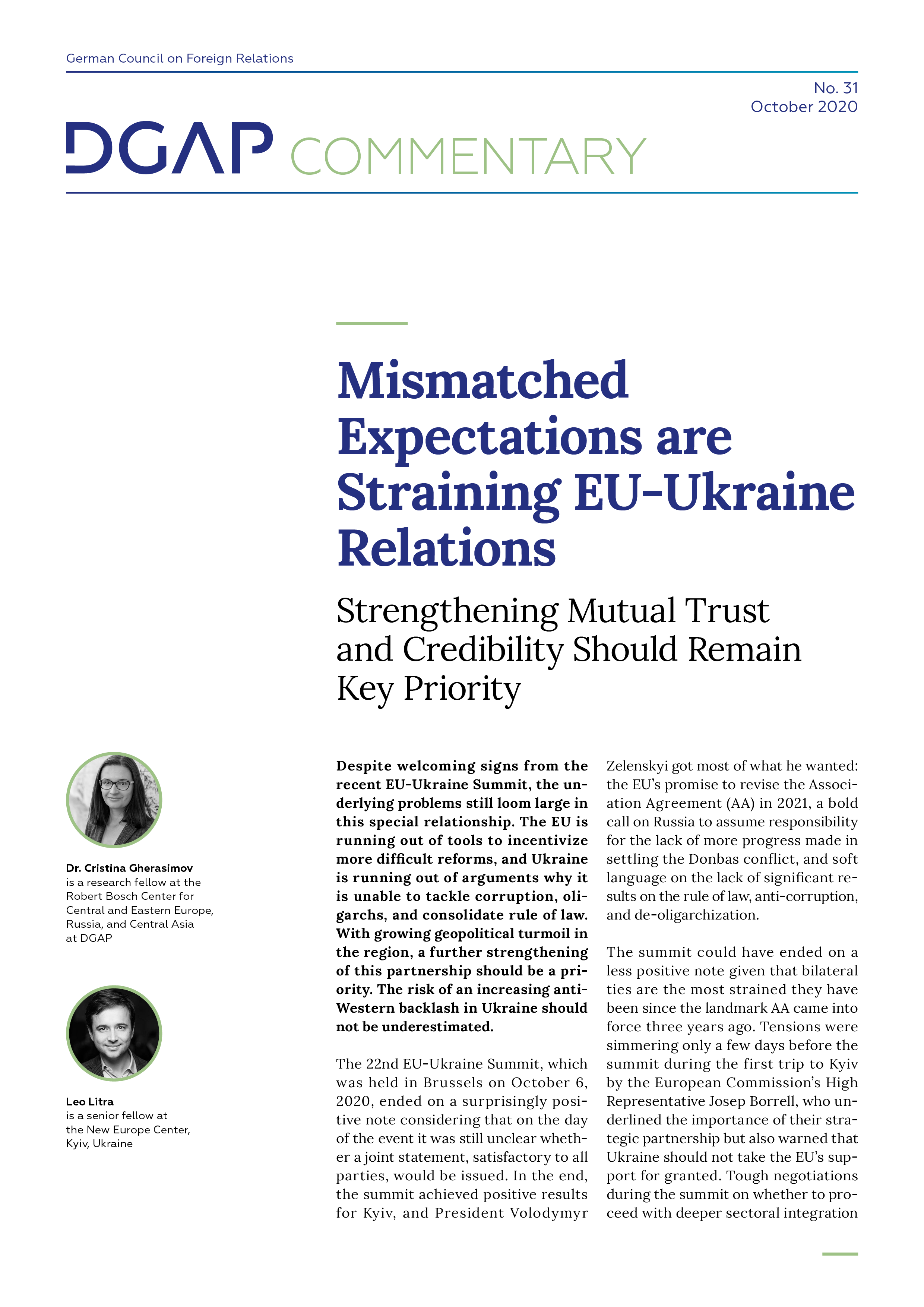The 22nd EU-Ukraine Summit, which was held in Brussels on October 6, 2020, ended on a surprisingly positive note considering that on the day of the event it was still unclear whether a joint statement, satisfactory to all parties, would be issued. In the end, the summit achieved positive results for Kyiv, and President Volodymyr Zelenskyi got most of what he wanted: the EU’s promise to revise the Association Agreement (AA) in 2021, a bold call on Russia to assume responsibility for the lack of more progress made in settling the Donbas conflict, and soft language on the lack of significant results on the rule of law, anti-corruption, and de-oligarchization.
The summit could have ended on a less positive note given that bilateral ties are the most strained they have been since the landmark AA came into force three years ago. Tensions were simmering only a few days before the summit during the first trip to Kyiv by the European Commission’s High Representative Josep Borrell, who underlined the importance of their strategic partnership but also warned that Ukraine should not take the EU’s support for granted. Tough negotiations during the summit on whether to proceed with deeper sectoral integration lasted until the very last minute. This was due to the significant reluctance of some EU capitals, particularly Paris, to give the green light to the gradual economic integration of Ukraine into the EU’s Single Market. Due to the lack of more EU incentives, and the fact that some member states are blocking the cooperation on the security dimension (another divisive issue among the EU-27), the EU has run out of tools. Except for financial and technical assistance, Brussels does not have a new big offer for Kyiv to motivate it to carry out further painful reforms.
The EU sees the rule of law and anti-corruption as key reform areas for Ukraine’s overall transformation. Some EU capitals, however, believe that Ukraine has not registered any significant progress in these fields. To Ukrainian decision-makers, the EU is less and less ready to deepen relations with Ukraine regardless of how the country performs on reform implementation. On the other hand, while the EU considers Ukraine a priority partner in its Eastern neighborhood, for President Zelenskyii bringing peace in Donbas has been the top priority since he took office in May 2019. For his administration, the EU has inadvertently become a secondary focus.
This growing mismatch of expectations and assessments of each other should be treated if not as a first crack in the neighborhood’s current security and stability architecture, then definitely as one that could pre-determine the EU’s long-term role and further credibility as a major player in the Eastern Partnership region. The EU should not avoid this problem or dismiss it as a low priority but rather seriously engage with these early warning signs as it has proved it can do at the recent summit. The best way forward is to rebuild mutual trust through a step-by-step approach towards the main objectives.
UKRAINE’S FRUSTRATION WITH THE EU
In recent years, Ukraine’s domestic reform agenda has focused almost exclusively on the implementation of the AA. But the process of implementation during the last three years has revealed what works well and what could work better in the AA. That is why one of the main points on Ukraine’s agenda is an update of the AA in a way that would better underline the mutual benefits of cooperation. Ukraine wants an agreement that reflects the current opportunities rather than those that were relevant when it was first negotiated. The EU’s hesitance to commit to a revision of the agreement was something that created a lot of tension prior to the summit.
Ukraine’s latest victory in finally getting the EU to commit to revising the AA may, however, only be a small first step. While the lack of progress on key reforms was glossed over at the summit’s press conference, this will later come back to haunt the Zelenskyi administration when it insists on “its own way” in the revision of the AA. That is because the outcome of this process will most likely depend on Ukraine’s reform track record. Ukraine’s credibility card in Europe is reform implementation.
The Association Agreement is a powerful instrument but it is insufficient to mobilize the efforts that the reform process demands.
The unwillingness to proceed with deeper sectoral integration in the areas of the four freedoms, proposed under former President Petro Poroshenko, is another factor affecting relations with the EU. These initiatives are mainly being blocked by those individual EU member states that perceive Ukraine as a serious competitor should it be given the same conditions as EU countries.
The lack of an EU membership prospect is certainly yet another factor that is demobilizing the euro-optimists in Ukraine. However, this does not mean that Kyiv and Brussels should not think about future mega-incentives, similar to the visa-free regime, that would motivate the Ukrainian government to conduct further deep structural reforms. Ideally, future incentives have to also cover the security dimension, which is currently being deliberately overlooked. This is, however, vital for Ukraine given Russia’s aggression. In this context, another factor causing a certain amount of anxiety in relations is the attempt by certain EU countries to seek a rapprochement with Russia despite the ongoing war against Ukraine.
The lack of ambition and clarity about the future goals in EU-Ukraine relations is not only demobilizing pro-EU groups in Ukraine but also allowing nationalists and euro-skeptics such as the pro-Russian forces and oligarchs to take advantage and attempt to manipulate public opinion in Ukraine. On the day of Zelenskyi’s visit to Brussels, Viktor Medvedchuk – a leading pro-Russian opposition leader and opponent of a European future for Ukraine – paid a visit to Russia’s President Vladimir Putin in Moscow. The risk of an anti-Western and anti-European backlash in Ukraine in the near future should not be underestimated.
RENEWED UKRAINE FATIGUE IN EUROPE
An important factor that is undermining Ukraine’s credibility and image in Europe, albeit not new, is “Ukraine fatigue.” This has been prevalent in EU member states for a while now and only risks becoming more serious. For one, there is no agreeable political solution to Donbas in sight, something that exposes the EU’s weaknesses when it comes to its foreign policy towards Russia. Despite some limited progress in the past year with the exchange of prisoners and a fragile ceasefire holding since July 2020, the conflict with Russia over the occupied region in Donbas is also hurting European economies due to the sanctions imposed on Russia. The divisions within the EU over how to handle Moscow’s behavior are hurting the unity of EU-27 and reveal a fragile consensus over the maintenance of sanctions. Until the Navalny poisoning, there were strong signals from major EU capitals of a desire to return to a normal relationship with Moscow. The “Russia reset” policy is now on hold, which plays in Ukraine’s favor, but does not mean it is abandoned. While how long this freeze on the reset lasts depends mostly on Russia rather than on Ukraine, the clear demand for a different relationship with Russia remains.
Second, during his first year and a half in office, President Zelenskyi and his team have not entirely been able to show a credible commitment to genuine domestic reforms in the eyes of their Western partners. More alarming, there are signs of rollback. There is mounting concern in the EU that there is no political will to fight vested interests. Furthermore, with a stalled judicial reform, recent attacks on anti-corruption institutions, and a lack of progress on key criminal investigations, Zelenskyi and his government are losing the EU member states’ trust. But building strong institutions through genuine reforms is the key to Europe’s heart and wallet.
Frequent reshuffles and the loss of institutional memory that comes with changing public servants are weakening Ukraine’s civil service when it comes to the process of reform implementation and maintaining contacts with Western governments. As a result, governments of some EU member states find it difficult to build a rapport with their counterparts in governmental institutions in Ukraine.
HOW TO MOVE FORWARD
Trust and credibility in international diplomacy are key to making partnerships resilient in times of crisis. This foundation might be at risk in the EU-Ukraine relations despite the recent summit’s good omens.
The EU needs to provide clarity on where it stands vis-à-vis Ukraine. The AA is a powerful instrument but it is insufficient to mobilize the unprecedented efforts that the reform process demands. Between association and membership new targets need to be set to incentivize reforms. One option could be the prospect of a “Norway model” for Ukraine, which would provide high levels of sectoral integration but no membership. The EU could also reenergize the partnership by further developing the economic dimension of the AA to make it mutually advantageous, provided it could agree on such positions within the Council. Considering the amount of support channeled towards Ukraine, EU institutions and member states could also beef up their expertise on the country. While the work of the Commission’s Support Group for Ukraine is regarded positively in Ukraine, the ultimate decision-making remains with the member states. And some states lack sufficient expertise on Ukraine and are also pursuing their own agendas, which do not necessarily overlap with that of EU institutions.
Ukraine, in turn, should use smarter tactics to diminish opposition within the EU from hesitant key member states in order to be able to extract more benefits for itself. Undoubtedly there is a clear need for more incentives for Ukraine to continue its reforms and to help it sell difficult structural transformations to the population as well as to financial interest groups that are interested in maintaining the status quo. However, the political leadership in Ukraine for its part could diversify its portfolio of demands by proposing smaller steps that could be jointly taken with the EU or with smaller coalitions of member states that are interested to deepen their relations with Ukraine such as, for example, Germany, Poland, the Nordics and Baltic countries plus the Czech Republic and Slovakia. In times of crisis, a mutual commitment to more feasible objectives and actions is more easily achieved and can help consolidate trust.
About the authors
Dr. Cristina Gherasimov, is a research fellow at the Robert Bosch Center for Central and Eastern Europe, Russia, and Central Asia at DGAP
Leo Litra, is a senior fellow at the New Europe Center, Kyiv, Ukraine


